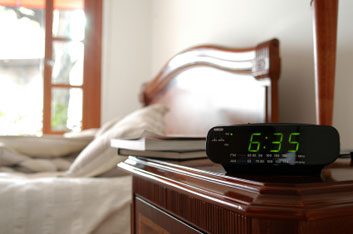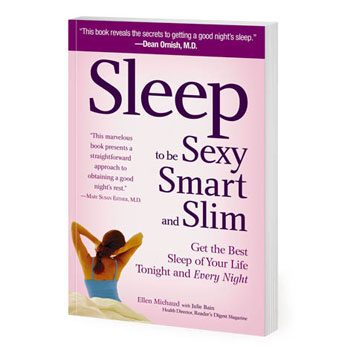
1. Work on stress
Since a study at the Finnish Institute of Occupational Health revealed that stressful events are twice as likely to trigger sleeping problems in those who experience anxiety, keeping a lid on daily stressors is important. Take a look at some of these stress-reducing tips, pick out your favourites and use them to do just that.

2. Reign in your work life
Give your heart to your work, but be a little more stingy with your time. Decide how may hours a week is reasonable to get your work done, add 10 percent in case you’re wrong, then walk away.

3. Swim
Or run. Or bike. Or skate. Or skip rope with some kids on the neighbourhood playground. You get the idea. Twenty minutes of aerobic exercise reroutes all the adrenaline that worry generates.

4. Put worry on a schedule
“In today’s busy world, we don’t have time to do normal worrying until the lights go out,” says Dr. Mary Susan Esther, director of the Sleep Center at South Park in Charlotte, North Carolina, and president of the American Academy of Sleep Medicine. “Yet everyone needs a worry time,” she adds. The trick is to schedule it on a regular basis, early in the evening-any time before 8:00 p.m.
Sit down with a stack of 3 x 5 index cards and ask yourself, “What am I worried about?” Then write down one worry on each card. When you seem to have written down your last worry, go back to the first card, reflect on the worry it describes, and give yourself a reality check.
Does the worry involve a problem that you can do something about? If not, rip up the card. If there is something you can do, write down possible actions and tuck the card into a worry box. You can give it more thought in the morning and decide what to do.

5. Stay off eBay
In fact, shut off your computer altogether, urges Esther. A lot of people with worry insomnia are tempted to go online before bed. “But the computer is interactive, so you can’t just watch, you have to respond,” says the sleep specialist. “And that interaction is stimulating enough to keep you up half the night.”

6. Relax in a bath
Once you’ve shut down the computer and had your scheduled worry session, a warm bath before bed will not only relax you, it will also adjust your body’s temperature to a point that signals your brain: “Hey, honey, it’s time for sleep.”

7. Hide the clock
“Digital clocks blare time at you,” says Esther. “It’s normal to wake throughout the night, but if you look at a clock and see the time, it’s likely to increase your anxiousness about not being asleep.” If you need a clock to wake you in the morning, just turn its face to the wall right before bed. You’ll hear it just as well.

8. Keep milk and cookies near by
Milk contains sleep-inducing tryptophan, but you need carbs to get it into your brain. Esther likes cookies (low-fat, of course) as the carb, but you could substitute crackers if you’d prefer.

9. Nix nightcaps
“Sometimes sleepless individuals will have a drink or two to help fall asleep,” says Esther. “While it will shorten time falling asleep, alcohol actually causes more arousal as your body metabolizes it.

10. Treat yourself well
Create a nurturing postbath, prebed routine that’s intended to help you wind down, says Esther. A little reading, a little soft music-whatever makes you feel nurtured and relaxed.
“We tend to take care of everyone else before we take care of ourselves,” says Esther. “That has to change.”

11. Stop those thoughts
Once you hit the sheets, worry time is over-especially about sleeping. There’s a therapy trick called “thought-stopping” that works like a charm, says Esther. “If you find yourself thinking about tomorrow and saying, ‘It’s going to be a bad day because I’m never going to sleep,’ immediately think: ‘Stop. Don’t go there. I know I’ve done this before. If I don’t fall asleep, I’ll get out of bed, flip through a magazine, but I’m not going to focus on this stuff!'” Sounds simple, but once you try it, you’ll find it works!

12. Restrict time in bed to sleep time
If you’re going to bed at 10:00 p.m., sleeping from 11:30 p.m. until 2:00 a.m., tossing and turning until 4 a.m., then sleeping until 6, you’ve gotten 8 hours inbed but only 4 ½ hours of sleep. That’s a huge mismatch, which can actually inhibit your sleep drive and cause insomnia all by itself. To prevent it, when you wake at 2, go read a book in the living room. Being up increases your sleep drive-which could make you sleepy enough to fall asleep when you return to bed.

13. Schedule your sleep time
“Stick with it seven days a week,” says Esther. Opening your eyes a the same time every morning triggers a series of bio-chemicals that, as the day winds down, tell your body when it’s time to sleep.

14. Work with a cognitive behavioural therapist
In a study at Laval University in Quebec, researches measured the effects of cognitive behavioural therapy for insomnia and found that insomnia practically disappeared among study participants.
Despite its intimidating name, cognitive behavioural therapy-or CBT-is simply learning new information about what keeps you from sleeping (the “cognitive” part) and learning how to manipulate your behaviour (the “behavioural” part) so that it doesn’t. It generally takes ony four or five 30-minute sessions to effect change.

15. Seek a sleep specialist
“If you’ve been struggling with a sleep problem for almost a month, talk to a sleep specialist,” suggests Esther. “You already know what your issues are, but a sleep specialist might be helpful by prescribing an anti-anxiety medication to use for a few weeks as you get control of your worries and establish better sleep habits.”
Related:
* 5 reasons to get more sleep
* Can you sleep too much?
* How to clear your mind so you can sleep

All you need to know about sleep
Did you know that the way you sleep can affect your weight, mood, energy, memory, and IQ? And that getting a good night of shuteye can even slow the signs of aging and protect against cancer and heart disease? This book is bursting with advice on how to get a better rest – without resorting to sleep aids. Learn how the foods you eat and medications you take can affect your sleep, and how taking a nap can actually reset your heart rate and blood pressure. With tips and tricks that are easy to integrate into your routine, you’ll be vibrant, sharp, and on your way to better health in a wink!
